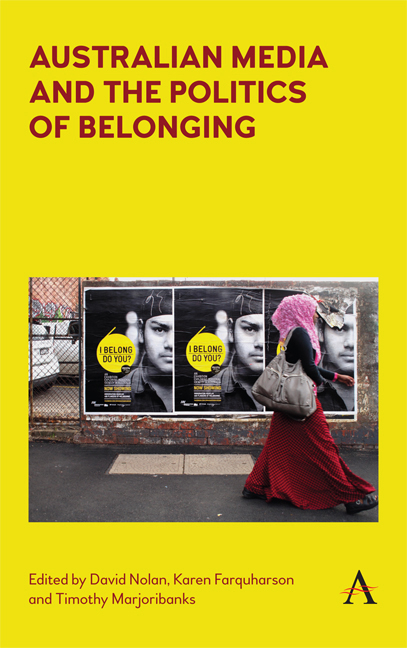Book contents
- Frontmatter
- Contents
- List of Illustrations
- Acknowledgements
- Part I THEORIZING BELONGING IN CONTEMPORARY AUSTRALIA
- Part II SUDANESE AUSTRALIANS, MEDIA PRACTICES AND THE POLITICS OF BELONGING
- Chapter 4 Talking about the Other: Sudanese Australians and the Language of Difference on Talkback Radio
- Chapter 5 In a Context of Crime: Sudanese and South Sudanese Australians in the Media
- Chapter 6 Journalism Practice, the Police and Sudanese Australians
- Chapter 7 Constructing the Heroic Other and ‘They Always Asked about Africa, They Never Asked about Me’: Three Screen Representations of Sudanese Australians
- Part III SHIFTING THE POLITICS OF BELONGING: MEDIA INTERVENTIONS AND POSSIBILITIES FOR TRANSFORMATION
- Notes on Contributors
- Index
Chapter 6 - Journalism Practice, the Police and Sudanese Australians
from Part II - SUDANESE AUSTRALIANS, MEDIA PRACTICES AND THE POLITICS OF BELONGING
Published online by Cambridge University Press: 21 June 2018
- Frontmatter
- Contents
- List of Illustrations
- Acknowledgements
- Part I THEORIZING BELONGING IN CONTEMPORARY AUSTRALIA
- Part II SUDANESE AUSTRALIANS, MEDIA PRACTICES AND THE POLITICS OF BELONGING
- Chapter 4 Talking about the Other: Sudanese Australians and the Language of Difference on Talkback Radio
- Chapter 5 In a Context of Crime: Sudanese and South Sudanese Australians in the Media
- Chapter 6 Journalism Practice, the Police and Sudanese Australians
- Chapter 7 Constructing the Heroic Other and ‘They Always Asked about Africa, They Never Asked about Me’: Three Screen Representations of Sudanese Australians
- Part III SHIFTING THE POLITICS OF BELONGING: MEDIA INTERVENTIONS AND POSSIBILITIES FOR TRANSFORMATION
- Notes on Contributors
- Index
Summary
Introduction
When a newly arrived immigrant group runs afoul of the major institutions in their adopted country, it becomes acutely difficult to develop a sense of belonging. This was the fate of Sudanese refugees who were settled in Melbourne in the first decade of the twenty- first century. They ran afoul of a police force that discriminated against them on the grounds of race and that led to media coverage which stereotyped them as associated with crime and violence (Nolan, Farquharson, Politoff, and Marjoribanks 2011). In turn, this created a climate of public opinion which the minister for immigration was able to exploit by pandering to right- wing fears of the ‘Other’ in an election campaign notable for its racist virulence. In these ways, the institutions of police, media and parliament showed themselves prejudiced. Fortunately, the institution of the judiciary proved to be a bulwark against this prejudice, leading to a measure of justice for some of those on the receiving end of harsh and unjust treatment, particularly by the police.
This chapter tells this story. It discusses the media coverage and the relationship between the media and the police, details the police misconduct and subsequent judicial proceedings, and touches on political opportunism. We argue that negative media discourses and discriminatory police conduct used racial stereotypes to target African Australians for imagined proclivities towards criminality. The extra policing experienced by African Australians and the media attention they receive provide politicians with the opportunity to single out African migrants for political purposes. We conclude by detailing how, despite experiencing systematic barriers to their integration into Australian society, through persistence, resilience and mobilization of the law, Sudanese peoples have achieved some success in their struggles to belong in Australia. We start with a discussion of media use of police sources that present and reinforce negative stereotypes of African migrants.
Policing the ‘Cronullas’: Media Coverage, Racist Discourse and Practice
The media perform a crucial role in shaping how different groups in society are seen by the society as a whole, which in turn can influence attitudes towards them, affect their civil rights, influence government policy towards them and may influence how individual members of those groups fare in everyday relationships with the wider society (Cottle 2000).
- Type
- Chapter
- Information
- Australian media and the politics of belonging , pp. 105 - 120Publisher: Anthem PressPrint publication year: 2018

